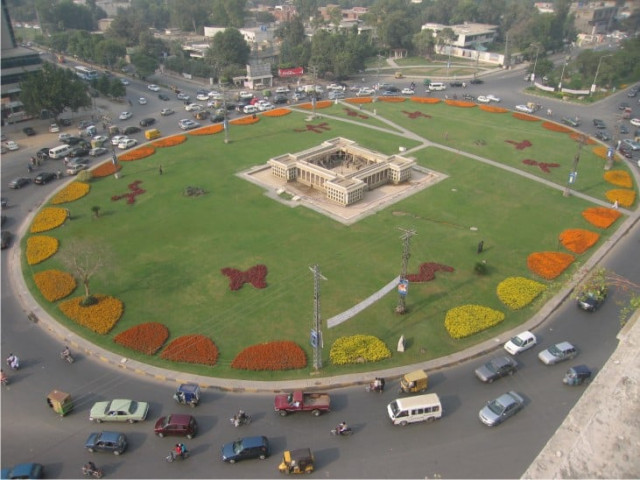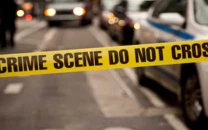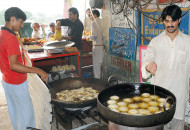Public protests: Shops, restaurants and democratic fervour
Increasing protests at Liberty Chowk demonstrate greater public participation in democratic process.

Disappearances in Balochistan, attacks against Hazara Shias and Ahmadis, drone strikes in the tribal areas, Raymond Davis, load-shedding, the detention of Dr Aafia Siddiqui, the ban on sheehsa – these are just some of the issues that have drawn protest rallies at Liberty Chowk recently.
In fact, local police officials estimate there are five protests a week on average at Liberty Chowk. These are usually small, peaceful and attended by members of the middle and upper classes. So why are there so many protests held at the heart of one of Lahore’s biggest commercial centre?
“The response of the people at Liberty Chowk is much better,” said Usman Ali, an activist who recently participated in a demonstration there in support of child rights.
The market at Liberty draws large volumes of shoppers every day. Some of them decide that the protest is for a good cause and end up joining in. “Getting through to new people counts as success for us,” says Ali.
He says this would never happen at another popular protest site, the Lahore Press Club, which is located at the base of Shimla Pahari on Davis Road.
Abid Ali, a news photographer who has been covering protests in Lahore for 20 years said the Press Club remains the most popular venue for small protests, because of the easy media access. But he says Liberty has become more and more popular in recent years.
And he says there is a clear distinction between the two venues in the identity of the protestors. The Press Club usually attracts the poor and desperate hoping to gain a little media attention so issues that affect them directly can be resolved. The protests at Liberty usually involve civil society protesting at injustices that don’t necessarily affect them directly.
Raheemul Haque of the Institute of Peace and Secular Studies said the frequent protests were an expression of greater public engagement with the democratic process by members of the upper and middle classes after many years of dictatorship. Another reason, he said, was the easy accessibility of Liberty Chowk. He said most residents of nearby areas were in middle and upper middle income groups.
“It is like Hyde Park,” said Justice (retired) Nasira Iqbal, referring to a park in London famous, among other things, for its Speaker’ Corner, where anyone can go and make a public speech on any topic.
“An atmosphere of free speech should be encouraged and Liberty Chowk has turned into one such spot for the people,” said Justice (r) Iqbal, a regular participant in protests organised by the Concerned Citizens of Pakistan.
She added that for small groups of activists and NGOs, Liberty Chowk was a good venue to gain access to large volumes of people.
Dr Mehdi Hasan, dean of the School of Media and Communication at Beaconhouse National University, told The Express Tribune that Liberty Chowk took off as a popular protest venue after the furore over men and women running together in a marathon held in Lahore during General Pervez Musharraf’s government.
Earlier, he said, Charing Cross and Regal Chowk Mall were popular protest sites. The former location, right in front of the Punjab Assembly, still sees demonstrations regularly, despite a ban on rallies on The Mall. The courts slapped the ban on public assembly there because of the damage to businesses on The Mall and the traffic nuisance.
Traffic is an increasing concern at Liberty Chowk too, said Liberty Station Housing Officer Hafiz Majid. “The flow of traffic is already very heavy at Liberty Chowk. With protests it obviously gets even more congested,” he said.
Protests are held around five times a week, but they are usually small and there are often no more than four or five policemen deployed for security, he said. The policemen are under instructions not to stop the protestors unless they turn violent, though that is rare, he said.
He said that organisers of protests were required to intimate the police in advance via the district coordination officer so they can assess security requirements, but this often did not happen.
Published in The Express Tribune, July 4th, 2012.


















COMMENTS
Comments are moderated and generally will be posted if they are on-topic and not abusive.
For more information, please see our Comments FAQ